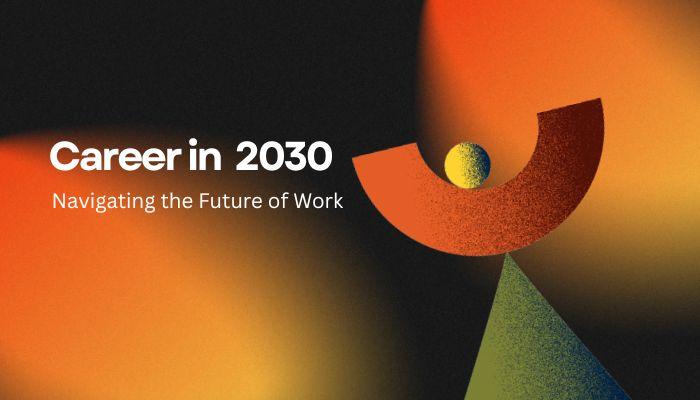Work is being transformed at an unparalleled pace. Every professional is thinking about what work is going to look like in 2030, with the rise of Artificial Intelligence, automation systems, climate change, and globalization. We are already witnessing a dramatic shift in how and where we work. Yet the change is growing more sweeping and has implications throughout the next decade.
From careers to competencies and skill profiles to workplace flexibility to lifelong learning, this article gives you a broad view of anything you would want to know about your career in 2030. Whether you are an employee, entrepreneur, employer, student, or only student right now, understanding the future of work in 2030 will be essential to help ensure that you are a success in the next generation.
Also Read: Top 5 Career Planning Tools You Need to Know About It
The Forces Shaping a Career in 2030
A number of them, known as megatrends, are shaping what a career in 2030, and in an increasingly interconnected way that can have both positive and negative impacts on the workforce.
- Tech innovations: From AI to automation to quantum computing, technology is revolutionizing all sectors. By 2030, AI will have automated a lot of the mundane work but will also create new jobs (AI trainers, ethicists, oversight people). Your career in 2030 has not yet been invented. You’ll need to adapt and become proficient with intelligent systems.
- Climate and Sustainability: The call for ‘green’ jobs reflects a worldwide focus on zero-emission targets. Those jobs in renewable energy, sustainable agriculture, and climate tech will provide solid career prospects in 2030 as governments and companies increasingly plan their activities with the environment in mind.
- Remote and Hybrid Work: The pandemic has shifted people to remote and hybrid work models, and these changes are unlikely to reverse now. Flexibility will be the focus of a career in 2030, and professionals will utilize platforms to work collaboratively across multiple boundaries.
- Aging Populations and Healthcare: Many nations’ populations are aging, and that is projected to drive up health and elderly care demands. In a career in 2030, these domains will feel familiar but will also feature innovative approaches and technologies, such as telemedicine, personalized medicine, and health tech innovation.
- Globalization and Localization: While globalization persists, local economies and supply chains are more important than ever. A career in 2030 might balance global collaboration and localized knowledge and expertise, depending on regional needs, from self-sufficient manufacturing and distribution to certification.
Emerging Job Roles in a Career in 2030
New and old job roles will emerge and be phased out as the industry evolves. A career in 2030 will involve job roles that incorporate human creative, emotional, and technical elements. The following are some of the significant job roles:
A typical career with a 2030 outlook will emphasize roles that integrate human-centered creativity and emotional intelligence with the adoption of technology.
- AI Ethics Specialists: Responsible integration of AI is becoming more apparent, and AI ethics specialists will navigate AI deployments free of biases and privacy. Therefore, this role will be critical in a career in 2030 due to its combination of expertise in technology and philosophy.
- Sustainability Consultants: Companies will need experts to design and implement green approaches. Sustainability consultants will advise organizations on how to meet net-zero goals, and therefore, this will be a huge job area by 2030.
- Virtual Reality (VR) Experience Designers: As VR and augmented reality (AR) become mainstream, designers will create immersive training, entertainment, and educational experiences, thus defining the new hybrid mix of the creative-technical design profession that will emerge career in 2030 in digital media
- Urban Farming Technologists: Urban farming is likely to increase as food security issues grow. Technologists developing vertical farms or hydroponic systems will have a growing professional career in 2030.
- Digital Nomad Coordinators: As the trend of remote work continues to expand beyond traditional measures, organizations will employ Digital Nomad Coordinators to ensure their distributed teams function productively and effectively. This position will be part of a professional career in 2030 in globalized workplaces.
- Health Data Analysts: Personalized medicine will be based on analyzing vast datasets. Health data analysts will explain genetic and biometric data to customize treatments, making this a high-demand career in 2030.
Skills for a Successful Career in 2030
The future (successful career) professional will need the right blend of hard, soft, and adaptive skills to fulfill work to succeed in a career in 2030. The following abilities will be required:
- Digital Literacy and AI Fluency: AI, coding, and data analysis will all be key skills to possess. Digital tools, on the other hand, will become a common language for non-techies and will be integral to a career in 2030.
- Critical Thinking and Problem-Solving: Judgment will be the most human skill of all, as automation handles repeatable work. Particularly career in 2030, critical thinking will be key in unclear and complex situations, as well as when direct instruction is sparse.
- Emotional Intelligence (EQ): Empathy, teamwork, and effective communication will continue to be key skills. However, that alone will not be enough. Even though the power of the bot is evident now, people in positions that require emotional intelligence (e.g., Manager, Leader, etc.) will still play a key role in careers in 2030.
- Sustainability Literacy: Environmental impact, renewable power, and the circular economy will become essential. Careers in 2030 with sustainability skills will be extremely scarce.
- Lifelong Learning: With everything changing as fast as it is, you need to be constantly retraining. For that time and beyond, human beings will need to look at their careers from a lifelong learning perspective and always be available to learn new skills and earn more professional certifications via online opportunities for the duration of their working lives, given the changing and dynamic nature of the work environment.
- Cultural Competence: As offices become increasingly diverse and global in scope, employees will have to be aware of cultural idiosyncrasies and sensitivities. Use cultural competency to create opportunities for collaboration, teamwork, and opening doors in a career in 2030.
Industries Driving a Career in 2030
Some sectors are expected to lead the job market and offer strong career opportunities in 2030. Here are the critical industries and career paths viewed through perspective:
- Technology and AI: From software development to AI policy, the tech sector will continue to dominate. A career in tech in 2030 will include machine learning engineers, cybersecurity specialists, and quantum computing specialists.
- Renewable Energy: Exposure to Solar, wind, and hydrogen energy will create opportunities. Engineers, policy analysts, and installation technicians will have better career opportunities in 2030.
- Healthcare and Biotech: Advancements in genomics, telemedicine, and wearables will provide opportunities for doctors, researchers, and health tech developers. A career in healthcare in 2030 is expected to be both better paying and more fulfilling.
- Education and EdTech: Traditional teaching will evolve and be replaced by personalized learning platforms. Teachers and edtech will be well placed in 2030.
- Space Exploration: A private company, SpaceX, is creating new genres of space tourism, mining asteroids, and developing extraterrestrial engineering. A career in space for 2030 will only attract career adventurers.
Preparing for a Career in 2030
Getting a Job in 2030, you need to prepare now. Here’s what you can do:
- Frequent Upskilling: Taking online courses on platforms like Coursera and Udemy to study AI, data science, and sustainability will keep me updated.
- Create a Personal Brand: An individual should have a significant online presence (specifically on LinkedIn) and build a portfolio that highlights their skills. Having a visible digital footprint will make you more successful in your career by 2030.
- Strategic Networking: Staying in touch with those in the field of green tech, AI ethics, and other emerging industries keeps us informed and well-equipped with knowledge. Networking will unlock a career in 2030.
- Embrace Flexibility: Embracing flexibility, such as the option to work remotely or take on freelance gigs, will become the standard in 2030. A career in 2030 will frequently involve ‘irregular’ work.
- Focus on Soft Skills: Skills in communication, empathy, and adaptability are essential to stand out. Career challenges in 2030. These skills will set you apart in a career in 2030.
Challenges in a Career in 2030
While opportunities abound, a career in 2030 will face challenges that professionals must navigate:
- Job Displacement: Manufacturing, retail, and administrative work may be affected by the displacement of positions due to automation. Therefore, a career in 2030 demands constant improvement of non-automatable skills.
- Skill Gaps: Relying on technological advancements increases the possibility of skills shortages. Hence, a career in 2030 circulation will require progression through education.
- Economic Inequality: Well-paid positions, including those in sustainable and technological fields, can be concentrated in specific areas. Thus, a career in 2030 operations will likely involve working remotely or relocating.
- Work-Life Balance: People working are often available due to digitized work and frequent redundancy, which can be exhausting. Therefore, a career in 2030 operations will involve prioritizing mental health and setting limits.
Also Read: 7 International Business Careers That Will Make You Stand Out
The Role of Education in a Career in 2030
A Career in 2030 through education traditional degrees will remain relevant, but Education will change to meet the demands of a career in 2030:
- Micro-Credentials: Short certifications in areas such as AI, sustainability, and data analysis will become increasingly popular. A career in 2030 operation will benefit from their employment.
- Interdisciplinary Learning: Employees will be more productive by combining technical knowledge and humanities expertise. A career in 2030 circulation favors multiple skills.
- Experiential Learning: Hands-on education is critical for a fast-paced future career; in 2030, this will be internships and apprenticeships.
- AI-Enhanced Education: Personalized systems will be the norm to prepare for a career in 2030.
Work-Life Integration in a Career in 2030
By 2030, careers will emphasize work-life integration, featuring flexible schedules and wellness-oriented workplaces. Employers will provide mental health support and may offer extended time off, professional sabbaticals, and hybrid working options to attract talent. Professionals will need to advocate for balance through time-blocking, mindfulness techniques, and finding ways to thrive in their careers in 2030.
The Global Perspective on a Career in 2030
Global dynamics will shape careers in 2030. In emerging economies, technology and green energy are likely to expand, providing greater scope for local talent. At the same time, innovation will continue in wealthier nations, especially in the fields of AI, biotech, and space. A professional looking for a career in 2030 is now ready to work outside of one country and will utilize tools of remote work to work across multiple countries.
Ethical Considerations in a Career in 2030
Moreover, ethics will play a significant role in a career in 2030. Professionals will face challenges from AI, environmental, and data privacy issues and must align their work with social and market values. A career in 2030 will incorporate roles in AI ethics, sustainable design, and corporate social responsibility.
Conclusion
However, those willing to be flexible will find enormous opportunities in the career of 2030. Pockets of innovation, sustainability, and polychromatic skills will lead professionals on stylish career paths. For a student, a mid-career professional, or an employer, the more they know about the trends behind a career in 2030, the likelier they are to stay ahead rather than fall behind or fall overboard. If you must remain engaged and employable in 2030, start upskilling, networking, and exploring new industries now.
FAQs
Q1: What will be the most significant change to the job of the future in 2030?
A: AI in the day-to-day job and the phenomenon of flexible, decentralized career paths.
Q2: Will college degrees still hold value in 2030?
A: Less than today. Talents, credentials, and real-world results may carry more weight.
Q3: Will I be able to work remotely in 2030 in my profession?
A: Absolutely. For most industries, remote, and hybrid work will probably become the new normal.
Q4: Which industries are expected to grow the fastest by 2030?
A: AI, climate tech, health care, cybersecurity, and digital education are leading the charge.
Q5: How do I prepare for my 2030 career today?
A: Get things started by learning future-proof skills, creating a varied career portfolio, and being adaptable.



